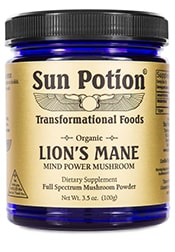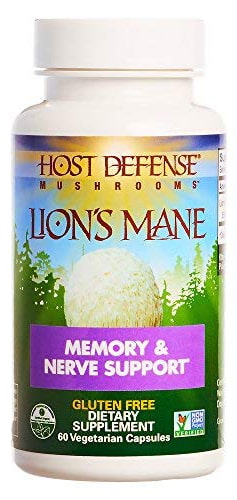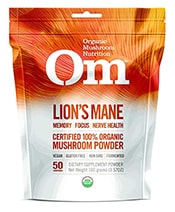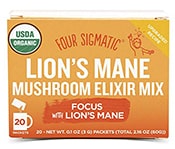The Miracle Mushroom:
The 10 Most Impressive Health Benefits of Lion’s Mane For Brain and Body
BY NOAH BERMAN & JUSTIN FAERMAN
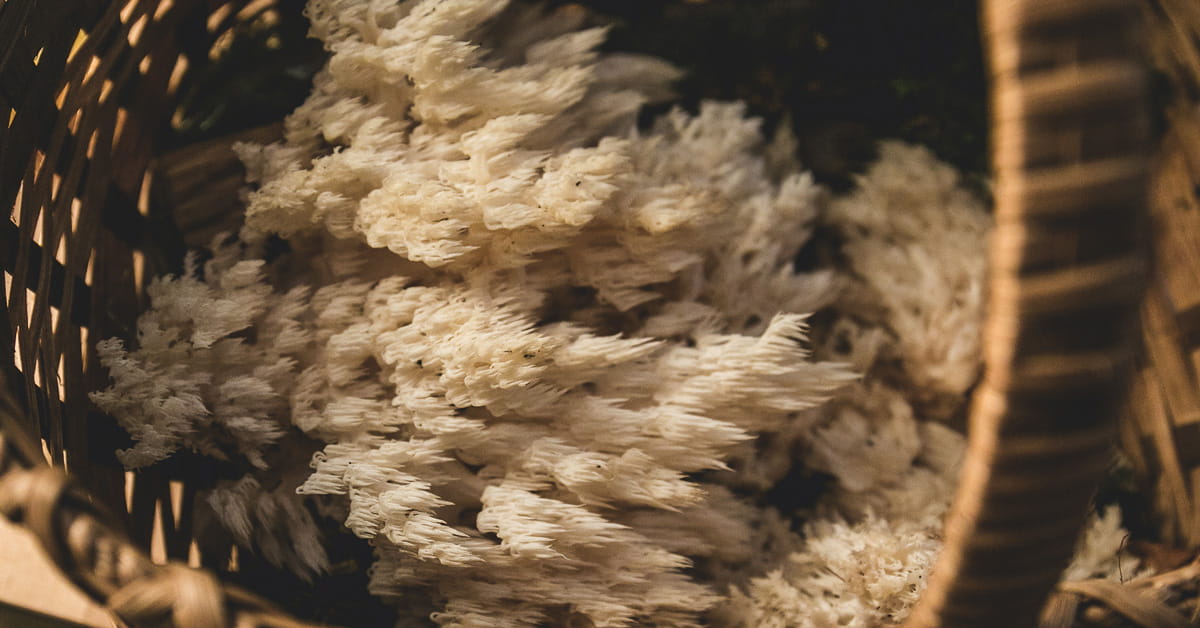
Most of us would love to be smarter, happier and healthier. And while there are many things needed to accomplish that, the research emerging around the highly medicinal Lion’s Mane mushroom is showing that it actually could be a big part of the puzzle. Revered in many ancient cultures and used medicinally for thousands of years, this powerhouse fungi can do everything from protect your brain against cognitive decline, boost memory, support immunity, reduce anxiety, boost mood and enhance a sense of focus throughout your day, among many other things.
Lion’s Mane mushroom (Hericium erinaceus) grows abundantly throughout North America, Europe and Asia. While native to all four continents, it has been only recently used amongst Western culture, although its value has been widely known and understood throughout Asia in regions like China and Japan for millennia. The mushroom physically looks like the mane of lion—long, white and shaggy—with rich tentacle-like dreadlocks of mushroom wisdom bursting out from all sides. It resembles spongy neuronal tissue, just like that of the brain (often in nature plants very conveniently provide visual cues to the things they are good for). It generally grows on harder surfaces rich in plant cellulose, namely trees in wooded areas.
Lion’s Mane benefits have been studied fairly extensively in animal models and more recently in clinical trials with humans. While Lion’s Mane has revealed itself as a solution for various health concerns, this mushroom has rapidly grown a reputation for its brain-health benefits and mood- and cognitive-boosting properties. While there are more studies needed in humans to truly establish this as one of the great medicinal herbs of all time, there has been fairly extensive research in animal models that are showing some promising results. However, because of its remarkable safety, its use has grown widely in recent years amongst biohackers and wellness seekers, with rave reviews across the board and more research slated to be published on the way.
So what exactly is so special about this superstar mushroom? Read on to find out.
1. Protects and Regenerates the Brain and Nervous System
Lion’s Mane is truly one of a kind. There is no other herb or mushroom that’s been found in nature that seems to have the same effect on stimulating the production of nerve growth factor and brain-derived neurotrophic factor (BDNF). [1,2] These are two remarkable compounds that essentially stimulate the growth of new nerve tissues and brain cells. Harvard psychiatrist John Ratey describes BDNF as “Miracle-Gro for your brain.” BDNF is a powerful protein that essentially stimulates the production of new brain cells and strengthens existing ones. More specifically, when your body releases BDNF, it flips the switch on a series of genes that grow brand new brain cells and pathways. High levels of BDNF make you learn faster, remember better, age slower and rapidly rewire your brain.
As if that wasn’t enough, BDNF also increases your brain’s neuroplasticity. When your brain cells get damaged or if you are facing a stressful situation, BDNF protects them and helps them come back even stronger. It causes your neural pathways to become more flexible instead of shutting down.
And that’s just BDNF. This mushroom is also the closest thing that’s been found in nature to a solution to regenerate nerve cell functioning via its stimulating effects on the production of Nerve Growth Factor (NGF). NGF is similar to BDNF, but it works throughout your nervous system—not just in the brain. It has been shown to repair damaged nerve tissue, cause regeneration of nerve fibers and also improve the communication between neurons and axons. It is currently being tested as an experimental treatment for depression, Alzheimer’s, Multiple sclerosis and other illnesses resulting from nervous system degeneration. [3,4,5] These compounds, among others, are also thought to help protect the brain against environmental toxins and defend against the natural effects of aging. [6]
2. Improves Cognitive Functioning, Memory and Ability to Focus
If you’re looking for natural, non-toxin brain steroids, then you need look no further than our fungal friend Lion’s Mane. Mounting evidence points to this mushroom as helping to support cognitive functioning, boost mental focus and improve memory. Research in humans found positive results on mental functioning in the elderly, [7] and the mushroom’s mood-boosting properties (more on that soon) help to promote a focused, calm and peaceful state of mind. Animal models show reduction in beta-amyloid plaque [8], a major bio-indicator that this mushroom can help to restore brain health; and there is also evidence that Lion’s Mane interacts with parts of the brain’s reward circuitry, specifically kappa-opioid receptors in the brain, that are related to learning and memory. [9] The biologically active compounds in Lion’s Mane are thought to easily cross the blood-brain barrier for optimal neural-activity.
It’s important to understand too that memory is innately tied to how neurons and nerves function in the brain. If Lion’s Mane has the potential to protect these through its stimulation of NGF and BDNF, then it can improve a lot of different functions, memory included. Early research is indicating this is possible and happening to varying degrees—in one study where test subjects were given extracts of Lion’s Mane mushroom, they demonstrated significant improvements in short-term memory. [10]
3. Improves Mood and Helps Relieve Symptoms of Anxiety and Depression
A few recent studies seem to indicate a positive, mood-boosting effect from Lion’s Mane. Recently, a study conducted on Japanese menopausal women (they gave them either Lion’s Mane cookies or the control placebo) found positive results in supporting emotional well-being and alleviating stress. [11] Other compounds such as Amycenone (a patented Lion’s Mane extract) have been tested in mice and have been found in animal models to help reduce depression and anxiety. [12] Additional studies in mice have also shown that the mushroom boosts levels of acetylcholine, an essential neurotransmitter that’s important for mood and mental functioning. [13]
Lion’s Mane mushroom benefits may also help to alleviate anxiety and depression through its powerful effects on reducing inflammation. A growing body of research is showing clear links between mental illness and brain inflammation, and Lion’s Mane has been shown to reduce the production of inflammatory proteins. [14–15]
And, finally, preliminary studies on mice are showing that it may achieve its effects on the mood front by upregulating neurogenesis in the hippocampus. [16] The hippocampus is the area of the brain that neuroscientists believe to be responsible for regulating things like emotional stability and memory.
4. Immune Support
Lion’s Mane, like most medicinal mushrooms, contains beta-glucans and polysaccharides indicated to help support healthy immune functioning. [17]
Studies in animal models have found enhanced immune functioning, particularly via antimicrobial activity in the gut and even anti-cancer activity from use of Lion’s Mane. Because of its bacterial effects in the intestines, it has been shown to induce positive changes in probiotic gut bacteria, which in and of itself has numerous positive effects in terms of immunity. The mushroom also has beneficial effects on insulinemic response and blood sugar response [18] and seems to have various anti-inflammatory properties, all of which largely work together on various pathways in tandem to keep the body’s immune system in tip-top shape.5. Has Anti-Aging Properties
Like many herbs and mushrooms that work in myriad ways throughout the body, one of Lion’s Mane health benefits is that it shows anti-aging effects both directly and indirectly by generally supporting overall health and well-being, as well as specifically stimulating bodily processes that are connected to slowed aging. In addition to slowing aging (and increasing the repair rates) of the brain and nervous system, Lion’s Mane polysaccharides have been shown to increase the activity of superoxide dismutase (a powerful antioxidant and cell protectant) in the brain and the liver [19] and have also exhibited anti-aging properties in human cell cultures. [20]
One remarkable study even found that giving mice who had been injected with a lethal dose of salmonella bacteria daily doses of Lion’s Mane extract nearly quadrupled their lifespan! [21]
6. Repairs the Gut
Taking a high potency extract of Lion’s Mane on a regular basis confers many health benefits, not least of which is helping to protect the gut in a number of ways. It has been shown both anecdotally and in studies on mice to protect and heal the lining of the intestines from developing ulcers and generally help with inflammatory conditions of the intestines like gastritis, Chron’s disease and colitis. [22,23,24]
One human study, focused on people with ulcerative colitis, found that taking a mushroom-based supplement containing 14% Lion’s Mane extract significantly reduced symptoms and improved quality of life after three weeks. [25]
7. Fights Inflammation
When it comes to medicinal mushrooms, one of Lion’s Mane greatest benefits is that it is hands down one of the best for fighting inflammation. One way to measure inflammation-fighting capacity is through antioxidant activity. In that realm, it’s is a superstar: one study examining the antioxidant capacity of 14 different mushroom species found that Lion’s Mane had the fourth-highest antioxidant activity. [26]
However, it takes more than just antioxidant activity to be an inflammation-reducing powerhouse, as there are many other pathways in the body that mediate it, including reducing excessive nitric oxide, prostaglandins, reactive oxygen species, and pro-inflammatory factors such as NF-κB, among others. It’s a good thing then, that Lion’s Mane works on all of these aforementioned pathways quite powerfully. [27,28,29]
8. Reduces the Risk of Cancer
Cancer is a complex disease, and Lion’s Mane should absolutely not be considered a cure by any stretch; however, early research is showing it holds promise and definitely warrants further investigation in this area. Lab and animal studies suggest that the mushroom has cancer-fighting abilities thanks to several of its unique compounds. [30–31] In fact, when Lion’s Mane mushroom extract is mixed with human cancer cells in a test tube, it causes the cancer cells to die at a faster rate. What’s more, is that this has been demonstrated with several types of cancer cells, including colon, stomach, blood and liver cancer cells. [32,33,34] Another fascinating study discovered that an extract of Lion’s Mane was actually more effective than traditional cancer medicines at slowing tumor growth in mice and also had fewer side effects. [35] But it’s also important to note that the cancer-fighting effects of Lion’s Mane have yet to be tested in humans, so more research is clearly needed.
9. Reduces the Risk of Heart Disease
In keeping with its reputation as a whole-body health tonic, Lion’s Mane mushroom benefits heart health in a number of ways, in particular, by balancing cholesterol levels as well as improving circulation throughout the body. One study done on mice found that consuming an extract of the mushroom reduced total cholesterol, in addition to the bad LDL variety and triglycerides, while also increasing the good HDL cholesterol. Further studies in rats and mice have found that Lion’s Mane also improves fat metabolism systemically. [36–37] In fact, in one of the papers, rats that were fed a high-fat diet while simultaneously being given daily doses of Lion’s Mane extract were found to have 27% lower triglyceride levels and 42% less weight gain after 28 days of the therapy. [38] Finally, it may also improve circulation by inhibiting platelet aggregation and preventing the thickening of arteries characteristic of atherosclerosis.
10. Psycho-Spiritual Effects
If all of that wasn’t enough, Lion’s Mane mushroom has been revered all through history for its culinary, spiritual and medicinal properties documented primarily within Asia. A long-time favorite of royalty and Buddhist Shaolin monks, the mushroom has been used historically to enhance and support meditation practice to generate “Qi”—a form of life force energy essential to an effective spiritual practice and for overall health and well-being—in the body. It was also referred to in Japan as “yamabushitake,” which means “Mountain Priest Mushroom,” a reference to its known effects on centering the mind and increasing spiritual potency.
What to Look for in a Quality Lion’s Mane Mushroom Supplement
Whenever possible, look for USDA-certified organic Lion’s Mane products or those certifiably harvested sustainably in the wild. Mushrooms always consist of an inner and outer network. The inner network is generally known as the mycelium, and the outer network is known as the fruiting body. Products grown in the wild generally have both of these parts, while products grown indoors often, but not always, contain only the mycelium. Ideally, look for a full-spectrum inner and outer network product, whenever possible.
Sometimes fruiting body-only products have richer levels of active compounds; however, these ingredients are often grown outdoors (meaning that the growing environment isn’t always controlled properly). This makes it important to be sure that the source doesn’t have airborne heavy metals contamination. This can be avoided by seeking US-grown products or making sure those that come from India or China are certifiably grown in rural, pollution-free areas.
Also, keep an eye out for products that use a heat-based or enzyme-treated mushroom extract as these methods help breakdown any potential anti-nutritional factors the mushroom may have produced in self-defense against predators that sometimes can slightly impede absorption.
Dose
As far as dosages go, depending on the extract and source, benefits can be achieved with as little as a few hundred milligrams and can exceed up to several grams daily. Benefits can also be achieved when taken every other day, rotating with other medicinal mushrooms.
Recommended Lion’s Mane Supplements
Organic Lion’s Mane Mushroom Powder
Sun Potion
Sun Potion offers an ultra-high quality, certified organic, US-grown, full-spectrum Lion’s Mane mushroom, including the fruiting body, primordia, spores and extracellular compounds produced throughout the entire life cycle for maximum medicinal potency and effectiveness. Minimally processed with a beneficial enzyme for optimum bioavailability.
Organic Lion’s Mane Mushroom Capsules
Host Defense
Host Defense offers an organic full-spectrum Lion’s Mane extract in convenient capsule form that is freeze-dried for maximum freshness and medicinal activity. Gently heat extracted to enhance bioavailability, their mushrooms are grown on their pristine farm where they can control the growing environment to enhance medicinal compounds in the product.
Organic Lion’s Mane Extract Powder
OM
OM offers a California-grown, certified organic Lion’s Mane mushroom extract grown using a specially developed methodology utilizing organic oats to produce a highly nutrient rich medicinal mushroom. This full-spectrum product is rich in polysaccharides, beta glucans, prebiotics, digestive enzymes, antioxidants, amino acids and more.
Organic Lion’s Mane Tea Elixir
Four Sigmatic
Four Sigmatic offers a tasty Lion’s Mane tea extract in a convenient sachet for easy use on the go. But make no mistake, this is an ultra-high quality product made with organic wood-grown mushrooms, just like you’d find deep in the forest, that packs a serious brain-boosting medicinal punch. Delicious as a tea or a non-caffeinated coffee substitute.
About The Authors
Noah Berman is the Co-founder and Head of Product at Higher Mind Wellness. After being diagnosed with Sjorgren’s Syndrome as a teen, Noah shifted his focus and life mission toward wellness. Since then, he has worked with doctors, scientists, and businesses such as Aloha, Evermore, Torii Labs, and Ritual.com to create natural health and wellness products. His primary focus is on the power of plants, fungi, biomimicry, algae, and the microbiome to restore health and wellbeing. He sees these as the future of taking our power back into our own hands. Learn more about his latest project at highermindwellness.com
Justin Faerman has been studying and writing about holistic health practices, herbalism and natural medicine for over 14 years and is a leading authority on both modern and ancient therapies for creating lasting health and wellness. He has a degree in Environmental Science from the University of California, Santa Barbara and has conducted field research into organic and regenerative agriculture practices and eco-social sustainability during his time there. He is also the Founder of Lotus Superfoods, a boutique purveyor of rare herbs and superfoods as well as the Co-founder of Conscious Lifestyle Magazine and the Flow Consciousness Institute. Learn more about his work at flowconsciousnessinstitute.com and lotussuperfoods.com
References
1. Lai PL, Naidu M, Sabaratnam V, et al. Neurotrophic properties of the Lion’s mane medicinal mushroom, Hericium erinaceus (Higher Basidiomycetes) from Malaysia. Int J Med Mushrooms. 2013;15(6):539-54.
2. Wong KH, Naidu M, David RP, Bakar R, Sabaratnam V. Neuroregenerative potential of lion’s mane mushroom, Hericium erinaceus (Bull.: Fr.) Pers. (higher Basidiomycetes), in the treatment of peripheral nerve injury (review). Int J Med Mushrooms. 2012;14(5):427-46.
3. Tuszynski MH, Yang JH, Barba D, et al. Nerve Growth Factor Gene Therapy: Activation of Neuronal Responses in Alzheimer Disease. JAMA Neurol. 2015;72(10):1139-47.
4. Colafrancesco V, Villoslada P. Targeting NGF pathway for developing neuroprotective therapies for multiple sclerosis and other neurological diseases. Arch Ital Biol. 2011;149(2):183-92.
5. Wiener CD, De mello ferreira S, Pedrotti moreira F, et al. Serum levels of nerve growth factor (NGF) in patients with major depression disorder and suicide risk. J Affect Disord. 2015;184:245-8.
6. Zhang J, An S, Hu W, et al. The Neuroprotective Properties of Hericium erinaceus in Glutamate-Damaged Differentiated PC12 Cells and an Alzheimer’s Disease Mouse Model. Int J Mol Sci. 2016;17(11).
7. Mori K, Inatomi S, Ouchi K, Azumi Y, Tuchida T. Improving effects of the mushroom Yamabushitake (Hericium erinaceus) on mild cognitive impairment: a double-blind placebo-controlled clinical trial. Phytother Res. 2009;23(3):367-72.
8. Phan CW, David P, Naidu M, Wong KH, Sabaratnam V. Therapeutic potential of culinary-medicinal mushrooms for the management of neurodegenerative diseases: diversity, metabolite, and mechanism. Crit Rev Biotechnol. 2015;35(3):355-68.
9. Saito T, Aoki F, Hirai H, Inagaki T, Matsunaga Y, Sakakibara T, Sakemi S, Suzuki Y, Watanabe S, Suga O, et al. Erinacine E as a kappa opioid receptor agonist and its new analogs from a basidiomycete, Hericium ramosum. J Antibiot (Tokyo) 1998 Nov; 51(11): 983–990.
10. Mori K, Obara Y, Moriya T, Inatomi S, Nakahata N. Effects of Hericium erinaceus on amyloid β(25-35) peptide-induced learning and memory deficits in mice. Biomed Res. 2011;32(1):67-72.
11. Nagano M, Shimizu K, Kondo R, et al. Reduction of depression and anxiety by 4 weeks Hericium erinaceus intake. Biomed Res. 2010;31(4):231-7.
12. Yao W, Zhang JC, Dong C, et al. Effects of amycenone on serum levels of tumor necrosis factor-α, interleukin-10, and depression-like behavior in mice after lipopolysaccharide administration. Pharmacol Biochem Behav. 2015;136:7-12.
13. Zhang J, An S, Hu W, et al. The Neuroprotective Properties of Hericium erinaceus in Glutamate-Damaged Differentiated PC12 Cells and an Alzheimer’s Disease Mouse Model. Int J Mol Sci. 2016;17(11).
14. Sheng X, Yan J, Meng Y, et al. Immunomodulatory effects of Hericium erinaceus derived polysaccharides are mediated by intestinal immunology. Food Funct. 2017;8(3):1020-1027.
15. Mori K, Ouchi K, Hirasawa N. The Anti-Inflammatory Effects of Lion’s Mane Culinary-Medicinal Mushroom, Hericium erinaceus (Higher Basidiomycetes) in a Coculture System of 3T3-L1 Adipocytes and RAW264 Macrophages. Int J Med Mushrooms. 2015;17(7):609-18.
16. Ryu S, Kim HG, Kim JY, Kim SY, Cho KO. Hericium erinaceus Extract Reduces Anxiety and Depressive Behaviors by Promoting Hippocampal Neurogenesis in the Adult Mouse Brain. J Med Food. 2018;21(2):174-180.
17. Zhu L, Wu D, Zhang H, et al. Effects of Atmospheric and Room Temperature Plasma (ARTP) Mutagenesis on Physicochemical Characteristics and Immune Activity In Vitro of Hericium erinaceus Polysaccharides. Molecules. 2019;24(2).
18. Chaiyasut C, Woraharn S, Sivamaruthi BS, Lailerd N, Kesika P, Peerajan S. Lactobacillus fermentum HP3-Mediated Fermented Hericium erinaceus Juice as a Health Promoting Food Supplement to Manage Diabetes Mellitus. J Evid Based Integr Med. 2018;23:2515690X18765699.
19. He X, Wang X, Fang J, et al. Structures, biological activities, and industrial applications of the polysaccharides from Hericium erinaceus (Lion’s Mane) mushroom: A review. Int J Biol Macromol. 2017;97:228-237.
20. Noh HJ, Yang HH, Kim GS, et al. Chemical constituents of Hericium erinaceum associated with the inhibitory activity against cellular senescence in human umbilical vascular endothelial cells. J Enzyme Inhib Med Chem. 2015;30(6):934-40.
21. Kim SP, Moon E, Nam SH, Friedman M. Hericium erinaceus mushroom extracts protect infected mice against Salmonella Typhimurium-Induced liver damage and mortality by stimulation of innate immune cells. J Agric Food Chem. 2012;60(22):5590-6.
22. Wang M, Konishi T, Gao Y, Xu D, Gao Q. Anti-Gastric Ulcer Activity of Polysaccharide Fraction Isolated from Mycelium Culture of Lion’s Mane Medicinal Mushroom, Hericium erinaceus (Higher Basidiomycetes). Int J Med Mushrooms. 2015;17(11):1055-60.
23. Qin M, Geng Y, Lu Z, et al. Anti-Inflammatory Effects of Ethanol Extract of Lion’s Mane Medicinal Mushroom, Hericium erinaceus (Agaricomycetes), in Mice with Ulcerative Colitis. Int J Med Mushrooms. 2016;18(3):227-34.
24. Jiang S, Wang S, Sun Y, Zhang Q. Medicinal properties of Hericium erinaceus and its potential to formulate novel mushroom-based pharmaceuticals. Appl Microbiol Biotechnol. 2014;98(18):7661-70.
25. Therkelsen SP, Hetland G, Lyberg T, Lygren I, Johnson E. Effect of a Medicinal Agaricus blazei Murill-Based Mushroom Extract, AndoSan™, on Symptoms, Fatigue and Quality of Life in Patients with Ulcerative Colitis in a Randomized Single-Blinded Placebo Controlled Study. PLoS ONE. 2016;11(3):e0150191.
26. Abdullah N, Ismail SM, Aminudin N, Shuib AS, Lau BF. Evaluation of Selected Culinary-Medicinal Mushrooms for Antioxidant and ACE Inhibitory Activities. Evid Based Complement Alternat Med. 2012;2012:464238.
27. Kim YO, Lee SW, Oh CH, Rhee YH. Hericium erinaceus suppresses LPS-induced pro-inflammation gene activation in RAW264.7 macrophages. Immunopharmacol Immunotoxicol. 2012;34(3):504-12.
28. Geng Y, Zhu S, Lu Z, Xu H, Shi JS, Xu ZH. Anti-inflammatory activity of mycelial extracts from medicinal mushrooms. Int J Med Mushrooms. 2014;16(4):319-25.
29. Lee KF, Chen JH, Teng CC, et al. Protective effects of Hericium erinaceus mycelium and its isolated erinacine A against ischemia-injury-induced neuronal cell death via the inhibition of iNOS/p38 MAPK and nitrotyrosine. Int J Mol Sci. 2014;15(9):15073-89.
30. Lee SR, Jung K, Noh HJ, et al. A new cerebroside from the fruiting bodies of Hericium erinaceus and its applicability to cancer treatment. Bioorg Med Chem Lett. 2015;25(24):5712-5.
31. Li Y, Zhang G, Ng TB, Wang H. A novel lectin with antiproliferative and HIV-1 reverse transcriptase inhibitory activities from dried fruiting bodies of the monkey head mushroom Hericium erinaceum. J Biomed Biotechnol. 2010;2010:716515.
32. Kim SP, Kang MY, Choi YH, Kim JH, Nam SH, Friedman M. Mechanism of Hericium erinaceus (Yamabushitake) mushroom-induced apoptosis of U937 human monocytic leukemia cells. Food Funct. 2011;2(6):348-56.
33. Li W, Zhou W, Kim EJ, Shim SH, Kang HK, Kim YH. Isolation and identification of aromatic compounds in Lion’s Mane Mushroom and their anticancer activities. Food Chem. 2015;170:336-42.
34. Li G, Yu K, Li F, et al. Anticancer potential of Hericium erinaceus extracts against human gastrointestinal cancers. J Ethnopharmacol. 2014;153(2):521-30.
35. Li G, Yu K, Li F, et al. Anticancer potential of Hericium erinaceus extracts against human gastrointestinal cancers. J Ethnopharmacol. 2014;153(2):521-30.
36. Choi WS, Kim YS, Park BS, Kim JE, Lee SE. Hypolipidaemic Effect of Hericium erinaceum Grown in Artemisia capillaris on Obese Rats. Mycobiology. 2013;41(2):94-9.
37. Yang BK, Park JB, Song CH. Hypolipidemic effect of an Exo-biopolymer produced from a submerged mycelial culture of Hericium erinaceus. Biosci Biotechnol Biochem. 2003;67(6):1292-8.
38. Hiwatashi K, Kosaka Y, Suzuki N, et al. Yamabushitake mushroom (Hericium erinaceus) improved lipid metabolism in mice fed a high-fat diet. Biosci Biotechnol Biochem. 2010;74(7):1447-51.
Recommended Product Disclaimer
The products recommended in this article may have different formulations than the products used in the studies and research cited in this article. As such, they may have different effects than have been reported by these studies. No claim is made or implied whatsoever as to the effects of any recommended products or their effects on health. The statements made in this article have not been evaluated by the FDA. Any products recommended are not intended to diagnose, treat, or cure any disease.






